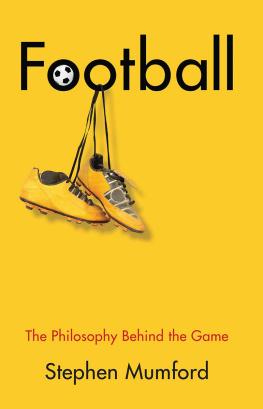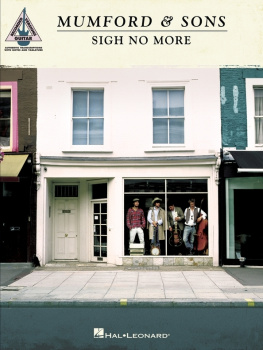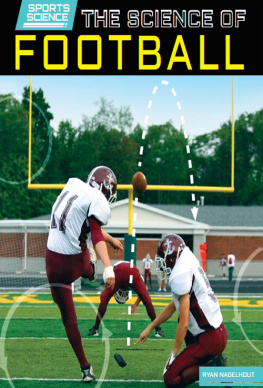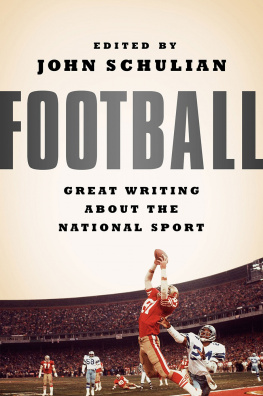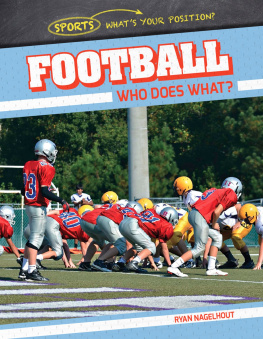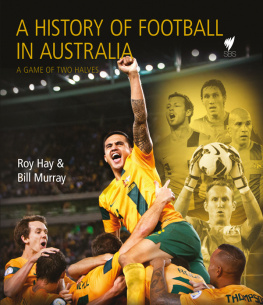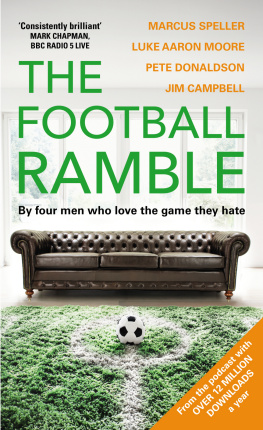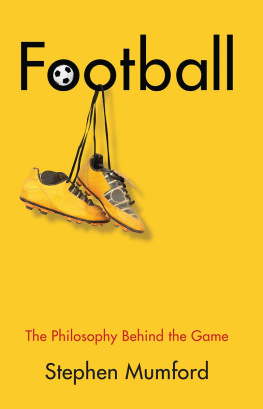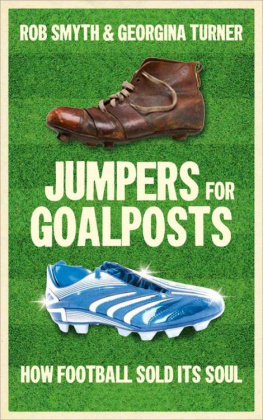
CONTENTS
Guide
Pages
Introducing Politys new series:
little books that make you THINK.
Quassim Cassam, Conspiracy Theories
Stephen Mumford, Football
Shannon Sullivan, White Privilege
Football
The Philosophy Behind the Game
Stephen Mumford
polity
Copyright Stephen Mumford 2019
The right of Stephen Mumford to be identified as Author of this Work has been asserted in accordance with the UK Copyright, Designs and Patents Act 1988.
First published in 2019 by Polity Press
Polity Press
65 Bridge Street
Cambridge CB2 1UR, UK
Polity Press
101 Station Landing
Suite 300
Medford, MA 02155, USA
All rights reserved. Except for the quotation of short passages for the purpose of criticism and review, no part of this publication may be reproduced, stored in a retrieval system or transmitted, in any form or by any means, electronic, mechanical, photocopying, recording or otherwise, without the prior permission of the publisher.
ISBN-13: 978-1-5095-3533-0
A catalogue record for this book is available from the British Library.
Library of Congress Cataloging-in-Publication Data
Names: Mumford, Stephen, author.
Title: Football : the philosophy behind the game / Stephen Mumford.
Description: Cambridge, UK ; Medford, MA : Polity Press, 2019. | Includes bibliographical references and index.
Identifiers: LCCN 2018043383 (print) | LCCN 2018045663 (ebook) | ISBN 9781509535330 (Epub) | ISBN 9781509535316 (hardback) | ISBN 9781509535323 (pbk.)
Subjects: LCSH: Soccer--Philosophy.
Classification: LCC GV943 (ebook) | LCC GV943 .M86 2019 (print) | DDC 796.334--dc23
LC record available at https://lccn.loc.gov/2018043383
The publisher has used its best endeavours to ensure that the URLs for external websites referred to in this book are correct and active at the time of going to press. However, the publisher has no responsibility for the websites and can make no guarantee that a site will remain live or that the content is or will remain appropriate.
Every effort has been made to trace all copyright holders, but if any have been overlooked the publisher will be pleased to include any necessary credits in any subsequent reprint or edition.
For further information on Polity, visit our website: politybooks.com
Introduction
Kick-off
This was my introduction. On 27 September 1980, I paid 1.50 to enter through a rickety-clickety turnstile and then ascend a tower of concrete steps to a black, peeling structure made of corrugated tin, looking to the outside world like a cowshed. There were gaps in the walls, through one of which I followed the expectant crowd. And there it was: a new, magical, vivid tableau stretched out in front of us; a lush expanse of green amid this drab corner of an industrial South Yorkshire city. Thousands of tightly packed fans, adorned in red, white and black, looked down from on high at the same sight. This was my first visit to Bramall Lane, the home to what is now, and will always be, my team, Sheffield United.
Everyone will remember their own introduction. The only people Ive met who dont are those who were taken first as infants. An introduction is a significant first encounter. Typically one is introduced to live football by someone else, as happened in my case. But it was not the first game I had seen. That was on television: the 1974 FA Cup Final, Liverpool versus Newcastle United. Green, red, black and white: how could that not fascinate a child watching on the familys recently rented colour TV? I loved football right away. Nor was it my first match in person. Id already visited The Shay, Halifax, and Elland Road, Leeds. But my Bramall Lane introduction was the one that stayed with me as it was a true beginning. Some introductions are by-the-by, quickly forgotten because they fail to initiate anything of note. Others are life changing, and this is certainly what happens when you first visit your home ground. When I ask others about their first such experience, they also volunteer, in dewy-eyed reminiscence, details of who gave them the introduction. A parent, grandparent or friend took them along and an eternal debt is owed. It wouldnt be easy to go alone the first time. Someone has to initiate you into the conventions and routines of how to use a football stadium and how to watch a game. You need to know when and what to cheer and also how to cheer, which Ive since found has variation across cultures. Football supporting is a learning experience.
As long as the introduction works, football has you for life. I have never known anyone who stopped liking football. I have met some who have never liked it in the first place, such as my grandfather, who called it fool-ball. But once the love is formed, it is going nowhere. I know some who stopped going to games but they just watch football in a different way, on TV. And there are plenty, such as myself for a time, who get annoyed with creeping commercial interests that corrupt the sport. It wasnt football that I disliked, though, it was what surrounded the game, and I simply went to watch the amateur version instead. Now Ive made peace with this transformed version of my first love. Ive accepted that I dont stand on uncovered terracing anymore, that the toilets are indoors, that I have to buy advance tickets instead of paying with cash at the gate. Ive even come to accept, worst of all, the music that booms out when a goal is scored. In return for my reluctant acceptance of these inconveniences, I now watch a brilliant team. The football is fast and fluid. Sheffield United play short-passing tiki-taka, and commit defenders forward constantly. The players are strong and fit, running tirelessly. They would beat any of the former sides of the past that I knew and loved. This is not only true of my team. All over, we are in a glorious epoch of skill, fitness and tactics. Just consider Portugal and Spain playing out a scintillating 33 draw in Russia in the summer of 2018.
The PortugalSpain game was a World Cup match, which leads me to acknowledge that there are different ways in which we watch football. My preference is always to watch a game in person since I like to be able to look at the whole pitch and see how play and formation develop. I like the fresh air on my face and to be surrounded by others who love football as much as I do. But many watch football on TV, and even I probably still see more games this way than at a stadium. And when we watch on TV, we are usually in a very different position as viewers. At Bramall Lane, I am a supporter, watching in hope of seeing a home win, and encouraging my team to achieve it. In most World Cup matches, I am doing something very different. I typically dont care too much who wins the game, when it is Morocco versus Iran, for instance. I watch because I want to see a good game of football. Of course, that might involve wanting to see some drama and a last-minute winning goal. But I wouldnt care too much whether it was Morocco or Iran who got it, since I am not a supporter of either. So with all the focus we get on fandom in football (see Paul Browns Savage Enthusiasm), and the post-Fever Pitch paradigm of watching the game with an allegiance, I think we should not be misled into thinking that the fascination of football belongs only to the loyal supporter. Football has an even stronger grip on us than that. We like to watch it even from the perspective of a neutral spectator, and sometimes even more so, since there is no stress from fear of defeat. There is no supreme moment of joy, either, when ones own side scores a goal. We will come to the significance of that experience in due course.
Next page
